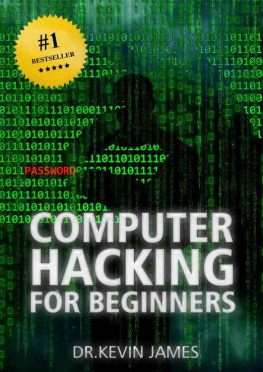Philippe Dylewski
OFFENSIVE INTELLIGENCE
300 techniques, tools and tips to know everything about everyone within companies, and elsewhere
Second edition

TABLE OF CONTENTS
Translated from French by Evelyn Balikanda
- Introduction
The first edition of this book dates back to the year 2010. At the beginning, it wasn't meant to be a book but a manual that I was creating little by little, to help me in my job as a private investigator. The lovely lady I lived with at the time pointed out to me that while spy novels were in plenty , spy manuals were not.
I did a rough layout, and I had 100 copies printed at the copy service, down the street. All of the copies were sold out with in a week. A few months later, tired of stamping and enveloping, I wanted to try my luck with publishers. Since I didn't know any, I used an address collector robot that I launched on Google. At the end of the day , I had more than 5,000 email addresses of French publishers . The accuracy of the addresses was not great, for I had addresses of manga publishers, that did childrens books or books about land. I used an emailing platform and in one hour, everything was sent with a nice letter and the book's summary.
Within a few weeks, I had received six contract proposals and I eventually signed with LExpress, a famous French publisher. Needless to say, they did a good job. They produced a wonderful book, promoted it and I had the narcissistic pleasure of going around to bookstores to see if they had my book in stock. The only drawback was that the book dealt with a sensitive subject and for legal reasons had to be edited. At the time, it seemed normal to me, that a publisher would want to protect himself from possible prosecution. I haven't changed my mind, however, if I wanted to write a truly offensive book, I had to feel free to be able to write whatever I wanted, including the worst. That's what you're starting to read.
This book is for professionals such as:
- Private investigators, intelligence and strategic intelligence specialists.
- Journalists.
- Marketing managers.
- SME managers.
- Recruiters.
- Law firms.
It is not intended for IT security managers or digital marketing gurus. On the one hand, they won't learn much in their sector, and on the other, this book deliberately places itself in the shoes of the attacker. It is not intended to protect your computer network or to help you sell on Amazon nor any other online store.
The goal is simple: to provide tools, techniques and methods that give you access to information about your competitors, suppliers, customers, employees and business partners. From what I see on a daily basis, my clients often make important decisions based on very little information. A good balance sheet, a nice resume, a little sympathy, and instincts do the rest. A good balance sheet does not mean much, a great resume can be bogus, and your instincts could be fooled.
I've often heard executives say things like "I don't care what my competitor does; I don't look at what my neighbor does". That's a noble attitude, but it doesn't seem to me to be any different from the officer who sends his men into battle without knowing anything about the enemy.
In no way do I advise spying on competitors in order to copy them, only to do better and to avoid being left behind. Monitoring your competitors is about learning from their strengths and weaknesses, what works and what doesn't. It's about learning and growing.
This manual that you are holding in your hands is intended to be easy to use. You will be offered hundreds of tips, methods, tools and links. Excluded from this book are anything related to programming and anything that requires a high level of technical knowledge. Expensive tools are also excluded. This his is a manual and therefore mere reading will not be enough; you will have to work and practice. Without that, it will be useless.
II. In-depth research on Google and Google hacking
1. The search engines
The basis of remote intelligence is Google . It's a must that you use it. Google is currently the number one search engine in the world, though it has one major drawback: it tracks your activities on its own behalf, or on behalf of third parties. Of course, you have nothing to hide, which means that youre not likely to be walking around naked outside your window! Simply because we have nothing to hide, does not mean that we agree to bare all.
Remember that you are using this manual for spying purposes, and that you may have to make requests that could one day have unfortunate consequences. Fortunately, you will be told later how to anonymize your searches.
Google is not uniformly present all over the world. China and Russia have their own alternative search engines and if you have investigations to do in these areas, it will be essential to use those. We will soon see how to overcome the language barrier.
Baidu is the leading search engine in China, with a share of over 70% of the Chinese Internet market.
The statistics diverge on this subject - It has more or less the same design as Google. If your investigation is within China, you may have no choice. Beware that Chinese search engines are heavily censored and if your search has political connotations, there is a big chance that you will not find what you are looking for. This engine is only of interest if you can make queries in Chinese. https://www.baidu.com

I can't resist showing you that I have a book translated into Chinese. If I do the same search on Google, I can't find this link. In the figure above, the search is conducted using our alphabet while I simply wrote that a query on Baidu must be written in Chinese. This is a special case, where the book translated into Chinese has a cover in Chinese, but the author's name is written in both alphabets.
Yandex is a search engine widely used in Russia, and is the market leader. https://yandex.ru/ is in Russian only but allows searches in English or French. This will not help you much; but if you are looking for specific Russian information, you will get it only by asking in Russian. We will see later that there is an intelligent translator that will solve your ignorance of Chinese and Russian for good.
There are many other search engines. The best known are; Bing, Yahoo or Ask . Others are less well known but offer a guarantee of discretion. Some are even environmentally friendly, at least according to their managers.
Bing really has a strong point compared to Google: its cartography is of a better level and its video search is more user-friendly. Apart from that, Google is still the master of the world.
2. The basic search
Google has access to less than 10% of the total web, 90% of the rest belongs to the invisible web, a nd its known. The same has been said about the human brain, that we only use a small part of its potential. What is certain is that there is so much information out there, that if you don't have sorting tools or do a thorough search, you won't find exactly what you are looking for. Google uses a ranking system called PageRank to rank search results from most relevant to least relevant. In fact, the more a site's address is listed by other sites, the more relevant that site is. Each link pointing to a page is considered a vote for that page. This means that when you conduct classic queries, you will find that the most popular results are not necessarily the most relevant.
Next page







